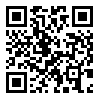مجله رویش روانشناسی از دادن گواهیهای کاغذی معذور است. لطفا تقاضا نکنید. همه گواهی ها در صفحه شخصی کاربران موجود است.
year 11, Issue 11 (winter 2023 2023)
Rooyesh 2023, 11(11): 1-14 |
Back to browse issues page
Download citation:
BibTeX | RIS | EndNote | Medlars | ProCite | Reference Manager | RefWorks
Send citation to:



BibTeX | RIS | EndNote | Medlars | ProCite | Reference Manager | RefWorks
Send citation to:
Hosseini M, Ashori M. (2023). The Child-Parent Relationship Therapy Program and Its Adaptation for Physical Impairment, Autism and Deaf Children : A Narrative Review. Rooyesh. 11(11), 1-14.
URL: http://frooyesh.ir/article-1-4139-en.html
URL: http://frooyesh.ir/article-1-4139-en.html
1- MA. student of Psychology and Education of People with Special Needs, Faculty of Education and Psychology, University of Isfahan, Isfahan, Iran.
2- Associate Professor, Department of Psychology and Education of People with Special Needs, Faculty of Education and Psychology, University of Isfahan, Isfahan, Iran. ,m.ashori@edu.ui.ac.ir
2- Associate Professor, Department of Psychology and Education of People with Special Needs, Faculty of Education and Psychology, University of Isfahan, Isfahan, Iran. ,
Abstract: (1790 Views)
The child-parent relationship therapy program is based on the principles of child-center play therapy and focuses on the parent-child relationship as a basis for behavioral and emotional changes. Parents learn therapeutic skills during this program, become emotionally attuned to their child, and focus on caring, empathic understanding, and acceptance. The aim of this study was to introduce child-parent relationship therapy, its objectives, description of the intervention, and its adaptation for physical impairment, autism, and deaf children. The present research method is a review and narrative type. To select the articles, the keywords of child-parent relationship therapy, physical impairment, autism, and deaf were used in reliable scientific databases from 2006 to 2022. 63 articles, theses, or books were found, of which 40 were selected. Exceptional children have special needs. The parents of these children also play a key role in supporting and caring for their children. Child-parent relationship therapy focuses on strengthening the parent-child relationship through relationship therapy. Also, the adaptations and recommendations of this intervention have been provided according to the type of disability of children, especially for physical impairment, autism, and deaf children. As a result, this type of play therapy can be used as an effective intervention to improve the behavioral, emotional, and social problems of different groups of exceptional children.
Type of Article: Analysis |
Subject:
General Psychology
Received: 2022/09/4 | Accepted: 2022/12/25 | ePublished: 2023/04/3
Received: 2022/09/4 | Accepted: 2022/12/25 | ePublished: 2023/04/3
Send email to the article author
| Rights and permissions | |
 |
This work is licensed under a Creative Commons Attribution-NonCommercial 4.0 International License. |






